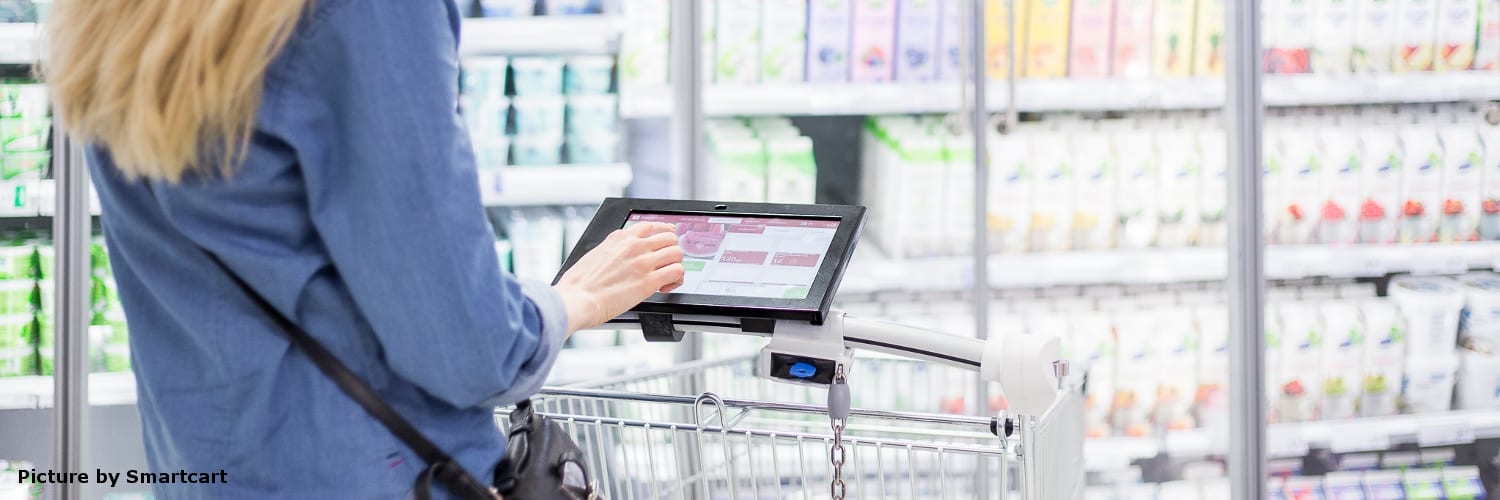The Finnish start-up aiming to crack the “intelligent supermarket”
When it comes to supermarkets, marketers have a problem; consumers make 70% of their buying decisions once they are in the store – meaning that a lot of marketing messages delivered to customers in their homes, cars or workplaces are wasted.
In an age when brands are increasingly reliant upon digital delivery of marketing messages, penetrating ‘brick and mortar’ spaces where consumers are at their most receptive to suggestions is proving a challenge. If the majority of decisions are made once the consumer is in the shop, browsing the aisles – how do you influence them in that moment?
The answer seems to lie in making the supermarket more ‘intelligent’ – but this is fraught with difficulty.
There has been a lot of buzz recently about Amazon GO – an intelligent store without cashiers – but the equipment needed to make this work – motion-tracking sensors and cameras, etc – looks prohibitively expensive for wide scale roll-out. So far only one upscale store in Seattle has it.
Adobe is trialling a system where brands can reach consumers in real-time through their mobile phones, but the problem with this is that it relies on consumers being happy with Adobe tapping into their mobile devices and making advertising suggestions based on their personal data. With GDPR looming, along with increasing consumer distrust, I find it hard to believe this system will work effectively.
One example that I believe does have mileage is Smartcart – a Finnish technology start-up that offers shoppers a seamless digital platform, not unlike an iPad, that is physically attached to every shopping cart in the store. It reacts to customer’s movements, product preferences and, like a ‘Google’ of the supermarket, allows customers to search for items and locate them. It contains all products, prices and availability, will assist with creating an easy to use shopping list – and even suggest recipes based on ingredients.
Currently Smartcart operates across 40 cities and over 50 medium and large supermarkets in Finland – but has plans to grow internationally, with a move into Latin America mooted for 2018.
Now, for full disclosure, I have to declare an interest in all of this. Since 2016, the Lifestyle Research Centre at emlyon has been working with Smartcart to investigate how new digital media impacts the changing consumption habits in stores, and also what the customer’s perception of such marketing tactics are. Earlier this year, along with the Kuulas Helsinki and Sailer research agencies, we carried out the largest digital retail marketing study ever done in Finland.
Looking at eight supermarkets across Finland, all equipped with Smartcart, we collected data from 761 consumers and filmed 100 ‘consumer journeys’ – and the results were extremely interesting.
57% of participants said that the product offers and advertising offered were useful to them, with advertising deemed most useful by 18-24 year olds and those aged between 45 and 65 years old. Those most interested in watching video content were women aged between 50 and 55. In contrast, only 14% said that they would rather be advertised to through social media such as Facebook.
The study also identified three distinct consumer groups with their own preferences. Price-conscious consumers are most concerned with finding lower prices, while Determined shoppers are more worried about optimizing the time spent in the store – both of these groups were only receptive to ideas and suggestions that allowed them to meet these specific objectives. However, the third group, Experience Seekers, were driven by exploration of new products, recipe ideas, in-store promotions and, most interestingly, inspiring suggestions. This group actively wants to be fed information that they otherwise would not have. Not surprisingly, this was the group that expressed the most positive reaction to Smartcart.
So – in a world where consumers increasingly want advertising to be well targeted and tailored to their needs, it’s clear that the ‘intelligent supermarket’ is the next logical step. But as consumers become ever-more weary of how companies procure the information to make this possible, it’s also clear that digital marketers have some significant hurdles to jump to be wanted and useful, rather than a nuisance.
Perhaps this is why Smartcart is currently the best bet for success. It benefits both the customer and the marketer (not to mention the shopkeeper). Customers get useful information when they need and want it most, and marketers get the opportunity to get their message to consumers when they are most likely to be influenced. In my eyes, this is a winning formula – but only time will tell!
This study was presented by Margherita Pagani during the Digital Lifestyle Research Day, Ecully, Dec. 4th, 2017.

Consumer researcher by training, I am a Finnish associate professor of marketing specialised in studying consumer experiences and culture and how they are mediated, impacted, and shaped through digital media. In my research I put emphasis on and develop creative audiovisual methods including videography in order to address the complexity of experience including temporality, space, movement, embodiment, affect, and materiality. I was the recipient of The Sidney J. Levy Award (2015) for my dissertation research. I have professional experience in marketing and business development in a leading Finnish FMCG company, Valio Ltd. and running my own company specialised in management training and consulting around the issue of customer experience. I also run the Lifestyle Research Center at emlyon business school.
More information on Joonas Rokka:
• His CV online
• His ResearchGate page
• His Academia page


Recent Comments